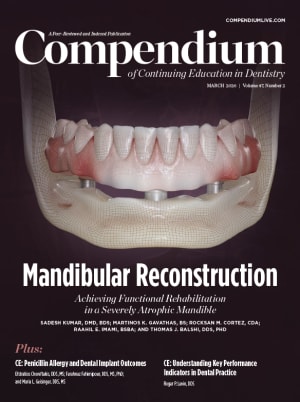Upgrading Your Practice Facility: Renovate or Relocate?
Michael Unthank, DDS, NCARB
Over time, dentists may become limited by their practice facility. Limitations that may arise can comprise a lack of treatment rooms, including hygiene areas; a business space that was hastily planned and now functions poorly; and an overall "practice image" that has become drab and no longer reflects the quality of services the practice provides. Additionally, the area or neighborhood in which the practice is located may have deteriorated, or perhaps the practitioner simply inherited an outdated office.
In the eyes of patients the dental facility is the physical rep-resentation of the quality of the practice's services. The office should convey that quality and thereby inspire patient confidence. The facility can enhance or hinder a dentist's professional image and impact staff enthusiasm and production. If the dental facility is lacking in any aspect, change may be needed, and a decision may have to be made whether to improve the facility or relocate.
A clear advantage of staying put is that the patients of record know where the office is. If the facility needs only some redecorating or a "facelift," this can be easily accomplished over two or three weekends without significantly disrupting production.
Beyond simply redecorating, however, remodeling brings with it a slew of potential complications, including whether there is adequate adjacent space available if an expansion is needed. Another consideration is whether or not the jurisdiction in which the practice is located requires the entire facility to be brought up to current codes when the remodeling exceeds a set percentage of the appraised value or the area impacted exceeds a set percentage of the existing square footage.
Desired changes typically impact not just one small part of the office but various areas, spreading construction throughout the facility. Construction is messy and contrary to the asepsis for which dental practices strive. Dust can permeate the entire office, and each work area must be isolated. Structural and utility "surprises" often appear when tearing down walls and can complicate the project. The existing heating, ventilating, and air conditioning (HVAC) system may be inadequate in relation to not only its air tempering effectiveness, but also its ability to provide high-efficiency filtration and pathogen control.
To avoid impacting production, contractors will need to work around the practice's schedule during evenings and weekends. This billable time is termed "off hours" and comes at a premium. Moreover, construction time may become drawn out as the project is divided into small, inefficient increments of work.
Typically, there comes a point during the remodeling project when the office will need to be closed, often referred to as a "two-week vacation." The challenge is identifying in advance exactly when this will occur. Depending on the amount of remodeling that will be needed, the office may have to be vacated for the entire construction process. Loss of production can become a significant portion of the actual cost of remodeling.
When remodeling and/or ex-panding, it is natural to try and save some of what exists. This approach can limit the potential to develop a successful office plan. As an architect and dentist, I can attest that rarely does the relationship of existing rooms and functions dovetail well with the goals of the new changes.
When deciding whether to remodel or relocate, each dentist's own unique situation will help dictate whether improving the existing office is more beneficial than moving. Are you able to incorporate the desired changes within the existing parameters? Will the end result be compatible with how you intend to practice? Will you be able to achieve the image you wish to convey to your patients? Will you have the flexibility to schedule around the contractor? Will you be able to absorb any unanticipated mandatory "vacation" time? If you answer affirmatively to these questions then remodeling may be the appropriate choice.
In comparison, by constructing a new office within a lease space, condominium, or their own new building, dentists have the advantage of starting with a clean slate. The plan can be tailored to their specific needs without compromise. The contractor can complete the project expeditiously during normal working hours without being interrupted, and the practice can occupy its fresh new space over a three-day weekend without significant loss of productive time.
Deciding whether to renovate or relocate can be a complex decision-one that gives a dental practice much to think about.
About the Author
Michael Unthank, DDS, NCARB
Owner, Unthank Design Group (unthank.com), a planning, architecture, and design firm exclusively dedicated to the dental professions; Private Practice, Lincoln, Nebraska
